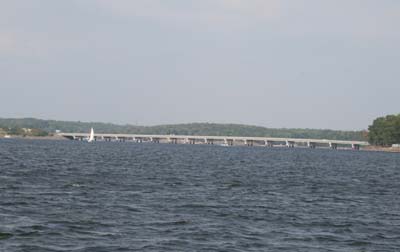Pictured above: Buster Boyd Bridge on Lake Wylie
Lake Wylie History
The Catawba River was named for the Native American tribe who first lived in the area, the Catawba Indians. In their own language, the Indians’ name for themselves is Yap Ye Iswe which means “People of the River.”
In 1899, Dr. Walker Gil Wylie, a physician, and his brother, Dr. Robert H. Wylie, conceived a plan to build a hydro station at India Hook Shoals near Rock Hill, SC, to generate power to a nearby textile mill.
Dr. Wylie and his brother incorporated the Catawba Power Company with financial backing from James “Buck” Duke.
“Catawba Lake” was created in 1904 when the Catawba Hydro Station (Wylie Dam) was built thereby damming the Catawba River to make electricity.
The dam was rebuilt and enlarged in 1924 which expanded the lake to its current size.
Catawba Lake or “the river” as it was commonly known, was renamed Lake Wylie in 1960 after Dr. Walker Gil Wylie. Dr. Wylie was a former president of the Southern Power Company which merged with the Duke Power Company in 1927.
Lake Wylie is the oldest of seven man-made lakes created by Duke Power along the Catawba River to regulate water flow for hydroelectric power.
Power Plants
Lake Wylie Hydroelectric Station has four generating units. It was named for Dr. Gil Wylie, first president of Southern Power Company, a predecessor company of Duke Energy. It is located on the Catawba River in York County, SC near Fort Mill, SC.
Allen Steam Station is a five unit coal-fired power generating facility located in Gaston County, NC. Allen Steam Station has been equipped with scrubbers to reduce the station’s sulfur dioxide emissions by approximately 95 percent.
Catawba Nuclear Station is located in York County. SC. Catawba is one of three nuclear stations operated by Duke Power. The three stations provide electricity to approximately half of Duke Energy’s customers in the Carolinas.
For more information, visit https://www.duke-energy.com/our-company/about-us/power-plants
Buster Boyd Bridge
The Buster Boyd Bridge, a Lake Wylie landmark since 1923, spans the lake connecting NC 49 and SC 49 at the border between North and South Carolina.
The bridge was named after a local farmer who campaigned for a bridge across the lake. It was recently rebuilt to accommodate four lanes of traffic. Learn more on Wikipedia.

